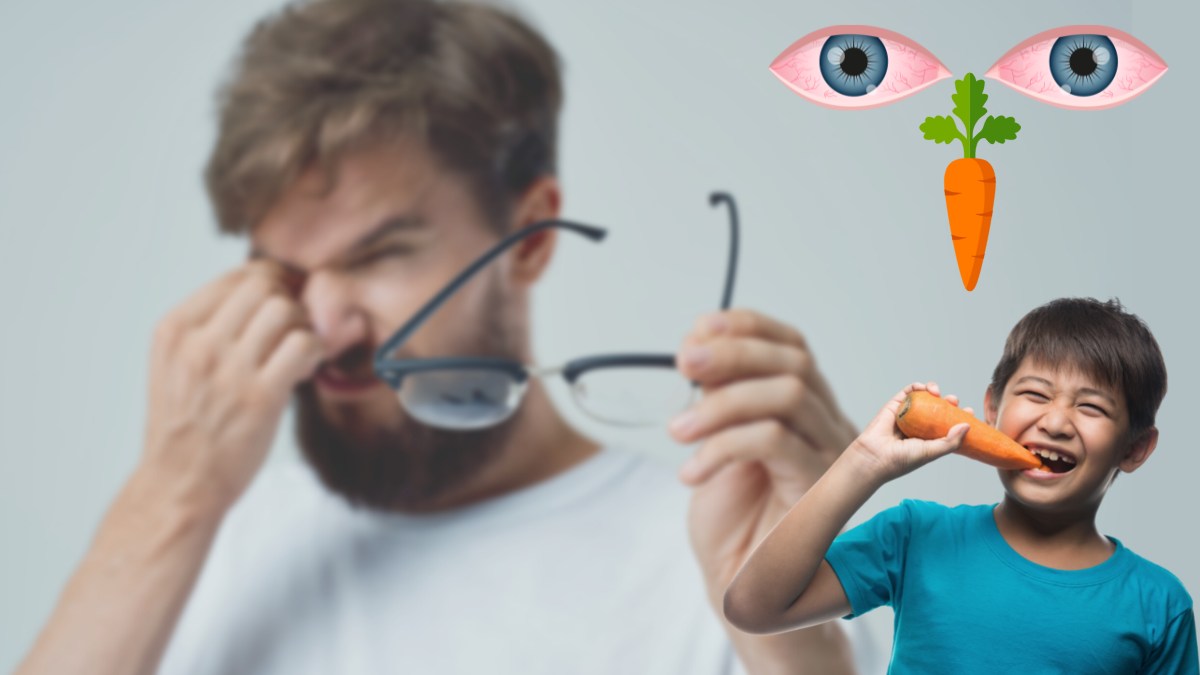Myth or reality: The link between carrots and good eyesight dates back to World War II. Even today, doctors prescribe eating yellow and orange fruits to maintain good eye health.
Carrots are rich in nutrients that have been shown to be beneficial for the eyes and help maintain good eye health. However, there are other assumptions prevailing in the world about carrots and their supposed miraculous benefits.
Some people believe that carrots can treat eye disorders such as nearsightedness and farsightedness, decrease eye power, and even provide night vision. Today we discover if there is any scientific basis behind these beliefs.
Read on to find out if the idea that eating carrots can improve your eyesight is a myth or reality. But first it is important to know the cause of weak vision.
Related: Myth or reality: cold showers and ice baths are beneficial for your health
What is the cause of poor vision?

Image source: Elements of health care.
There are many causes of poor eyesight; some are congenital, hereditary, or related to injuries and poor nutrition. The most common cause of low vision is refractive errors such as myopia and hyperopia.
These disorders usually develop at a young age and the scientific community has not been able to reach a general consensus on their exact origin. But they are mostly hereditary.
Myopia occurs due to the elongation of the eyeball. This can happen due to hereditary factors, prolonged screen use, or poor nutrition. Myopic patients have difficulty seeing distant objects.
On the other hand, farsightedness occurs when the eye is shorter than normal or the cornea is not curved evenly. This results in difficulty seeing nearby objects.
Some children outgrow these vision problems during puberty as the shape of their eyes changes, while others continue to suffer throughout their lives.
Other eye disorders, such as glaucoma and cataracts, are largely age-related and are likely to occur in most people. Diabetes, astigmatism and dry eye are also the main causes of poor vision in people.
Related: Myth or reality: the use of deodorants and antiperspirants causes cancer
Carrots: nutritional value and benefits

Image source: wikimedia commons
Carrots are rich in antioxidants, fiber and vitamin A, all very beneficial nutrients. Vitamin A is known to help vision and its deficiency causes night blindness, a condition in which people have difficulty seeing in the dark.
Carrots also contain antioxidants such as beta-carotene and lutein that prevent eye damage attributed to free radicals, unstable molecules that are byproducts of cellular metabolism and cause damage to other molecules.
Carrots are rich in beta-carotene, a pigment that gives color to fruits and vegetables. Beta-carotene is a precursor to vitamin A and is necessary to maintain cellular and visual health.
Carrots, especially yellow ones, also contain lutein, an antioxidant that prevents age-related macular degeneration (AMD). Other benefits of regularly consuming carrots include good digestion and cardiovascular health, thanks to their fiber content.
Related: Myth or reality: Green tea helps burn body fat and lose weight
How did the belief that carrots improve eyesight originate?
The idea that carrots are a magical food that gives people almost superhuman vision originated during World War II. These were difficult times and most of Europe was struggling with food shortages. In a propaganda campaign, the UK government advocated eating carrots to help see better in the dark, which was especially important as the Germans frequently bombed Britain, causing city-wide blackouts. In the absence of grains and meat, people were recommended to grow and consume vegetables such as tomatoes, potatoes and carrots. Over time, the theory grew that carrots improve eyesight. Today, this is taught in school books as a fact.

Image source: US National Archives
What does science say about carrots and the link between good eyesight?
According to science, there is no concrete link between carrots and improved vision. Sure, carrots are abundant in vitamin A and antioxidants that prevent eye diseases and maintain overall health, but the vegetable doesn’t do much to improve eyesight.
You can eat all the carrots you want, even outperform a rabbit, but it will have no effect on improving your eyesight if you already suffer from ailments such as glaucoma, myopia or diabetes. The only eye problem that carrots will improve is night blindness. And even then, greens and sweet potatoes have significantly more beta-carotene and dairy products have more vitamin A than carrots.
Here are some things that really help improve eyesight, according to renowned scientists and ophthalmologists.
- Regular exposure to natural light, especially first thing in the morning.
- Little screen time
- Maintain a nutritious diet and optimal weight.
- Refrain from smoking and drinking alcohol.
- Eye exercises
Related: Myth or reality: you can’t sneeze with your eyes open
Bottom line
Carrots are a highly nutritious vegetable that offers a multitude of health benefits to people. However, improving vision is not one of them. Carrots are good for the eyes, without a doubt. They are rich in nutrients that improve eye health and prevent diseases, but that fact has no relationship with improving vision or treating diseases.
It is one thing to prevent a disease and quite another to treat it. Unfortunately, people seem to have misunderstood the concept of carrots as “good for eyesight” and “improving eyesight.” As for the abundance of vitamin A in carrots, it will help you from going completely blind in the dark rather than providing you with night vision. Therefore, we can conclude that the belief that eating carrots can improve eyesight is a myth.
Read also: Fact or fiction: taking vitamin C prevents and treats the common cold
Read also: Fact or fiction: The Great Wall of China is visible from space
Categories: Optical Illusion
Source: ptivs2.edu.vn
